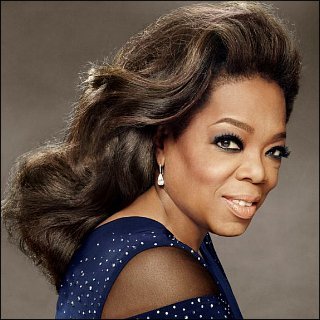 Oprah Winfrey is not just another famous African-American entrepreneur. She is one great example of a person who has succeeded to rise from poverty and overcome terrible experiences in her past because of her determination and hard efforts. Her decisions to constitute her own destiny and her self-confidence make her the perfect role model for any women in the world. All these qualities that she possesses have led her to become one of the most influential people in the world as Vanity Fair Magazine has praised her: "Oprah Winfrey arguably has more influence on the culture than any university president, politician, or religious leader, except perhaps the Pope." Despite her enormous wealth and popularity, she remains as a humble and warm-hearted person who continues to be an inspiration for every person. No wonder many awards have been rewarded to her as the token of admiration and honor, including a Daytime Emmy Lifetime Achievement Award from the National Academy of Television Arts and Sciences in 1998. Nevertheless, her journey to achieve all of these has not been easy as there were many obstacles during the process.
Oprah Winfrey is not just another famous African-American entrepreneur. She is one great example of a person who has succeeded to rise from poverty and overcome terrible experiences in her past because of her determination and hard efforts. Her decisions to constitute her own destiny and her self-confidence make her the perfect role model for any women in the world. All these qualities that she possesses have led her to become one of the most influential people in the world as Vanity Fair Magazine has praised her: "Oprah Winfrey arguably has more influence on the culture than any university president, politician, or religious leader, except perhaps the Pope." Despite her enormous wealth and popularity, she remains as a humble and warm-hearted person who continues to be an inspiration for every person. No wonder many awards have been rewarded to her as the token of admiration and honor, including a Daytime Emmy Lifetime Achievement Award from the National Academy of Television Arts and Sciences in 1998. Nevertheless, her journey to achieve all of these has not been easy as there were many obstacles during the process.
Oprah was born on January 29, 1954, in Kosciusko, Mississippi, USA from an unmarried young couple. Originally named as Orpah, the family and people around her often addressed her as Oprah, so she went on to use this particular name. She was nurtured by her paternal grandmother after her parents decided to have a separation. Living at her grandmother's farm in rural Mississippi, she learned to read and practiced recitations at the age of 3. Her serene life became miserable after she moved to her mother's home in Milwaukee, Wisconsin in 1960. Because of her mother's lack of affection and attention, she turned into a wild girl who was involved in drugs while also suffered sexual harassment. In 1968, she lost her premature baby who died shortly after being born. Her mother then sent her to Nashville, Tennessee to be put under strict rules and high standards of her father. Despite being an austere man, her father actually taught her to be a discipline and purposeful person. "As strict as he was," she recalled, "he had some concerns about me making the best of my life, and would not accept anything less than what he thought was my best."
With her father's help, Oprah gradually fixed her chaotic life. At East Nashville High School, she became a brilliant student, joined drama club and student council, even was appointed to attend the White House Conference on Youth. After having graduated in 1971, she received a four-year scholarship to Tennessee State University. She began to develop broadcasting career at 17, working for WVOL radio in Nashville. During her study at the university, the nineteen-years-old Oprah made a fabulous movement by becoming both the youngest and the first African-American female news anchor at WTVF-TV in Nashville. In 1976, she finally graduated with a degree of B.A in Speech and Performing Arts. Shortly thereafter, she moved to Baltimore's WJZ-TV, working as a reporter as well as the co-anchor of the six o'clock news. She did not quite enjoy her job since she had to perform less emotion while announcing news. Thus, she gladly took the offer to be the co-host of an early morning talk show entitled "People are Talking." "It was like breathing to me," she remarked, "Like breathing. You just talk."
The year of 1984 marked Oprah's career as she came to Chicago and was chosen to host a local talk show called "AM Chicago" at WLS-TV. The show surprisingly became popular within several months so that it was extended to be a one-hour show. Following the show's success, its name then was changed into "The Oprah Winfrey Show" in September 1985. She received marvelous accomplishment as her show was aired nationally on September 8, 1986, soon strived to be the number one talk show in U.S.. It is because she established a different kind of talk show that for the first time a host willingly shared her personal life with the audiences, talking about her friendship with Gayle King or making anecdotes about her partner, Stedman Graham. As a host and interviewer, she revealed her empathy along with emotions, thus making her show humanly and uniquely exceptional. In the same year, Oprah built Harpo Productions, Inc. She afterwards took over the show from Capitol Cities/ABC to be under her production company, therefore becoming the first black woman in history to possess and produce her own talk show. In the following year, "The Oprah Winfrey Show" gained three Daytime Emmy Awards for Outstanding Talk/Service Program, Outstanding Direction, and Outstanding Host.
While "The Oprah Winfrey Show" previously followed the format of traditional talk show, it started to reach more critical problems which had been considered by Oprah to have an important repercussion and straight relevance toward women. During her show, she also included people who underwent dreadful experiences and those in deficient conditions. This makes the show more exceptional also meaningful so that it comes to be the highest rated television talk show program ever. Being watched by up to 20 million U.S. audiences every week, "The Oprah Winfrey Show" has spread its charm to more than 130 countries worldwide, such as Singapore, Bangladesh, Cyprus, and Mongolia. Furthermore, this magnificent show had collected 30 Daytime Emmy Awards throughout 1987-1998. Being the most successful talk show host in the world, Oprah took a deal to extend her show until 2011 which means that the show will have been broadcast for 25 years.
Oprah's concerns are not only focused on her talk show since she has been interested in acting and entertainment. In 1985, she starred in Steven Spielberg's "The Color Purple" and was chosen as an Academy Award nominee for her role there. In the following year, her next film entitled "Native Son" was released. Her three other big screens were "Throw Momma from the Train" (1987), "Listen Up: The Lives of Quincy Jones" (1990), and "Beloved" (1998). Not only played roles, she even produced some TV programs through Harpo Productions while also made appearances, such as in "The Women of Brewster Place" (1989), "There Are No Children Here" (1993), and "Before Women Had Wings" (1997). The rests were, among others: "The Weddings" (1998), "Tuesdays with Morrie" (1999), "Amy & Isabelle" (2001), and "Their Eyes Were Watching God" (2005). Oprah kept exploring any possibilities to actualize her wishes of bringing out the social consciousness. She created an on-air book club in 1996, ventured in the printed media industry by publishing "O, The Oprah Magazine" and "O At Home," then set up her own cable television network named "Oxygen" in 1999.
In spite of her hectic activities, Oprah appears to be actively involved in some projects of humanity. In 1991, she commenced a proposal urging U.S. government to provide a national database of convicted child abusers that was later issued as "Oprah Bill" in 1993. She collects funds for charities through her organization, Angel Network, while also establishing Family for Better Lives Foundation. Humanity is not her only concern for she also possesses a deep thought about education. Realizing that it is essential, she dedicated herself in this particular field, conducting The Oprah Winfrey Scholars Program, Oprah Winfrey Leadership Academy for Girls, and Christmas Kindness through Oprah Winfrey Foundation. "For me, education is about the most important thing because that is what liberated me," she said. "Education is what liberated me. The ability to read saved my life. I would have been an entirely different person had I not been taught to read when I was an early age."








